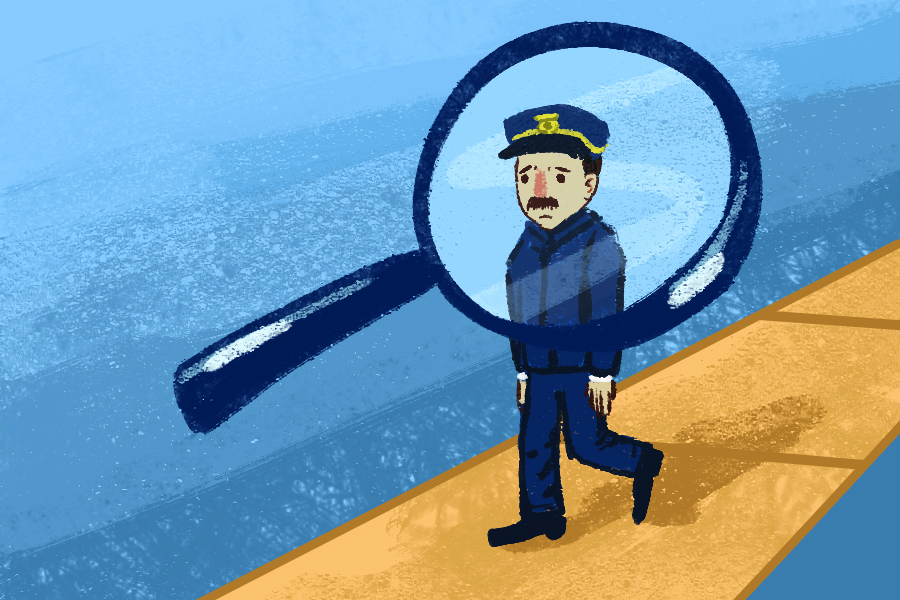
Group hopes to improve reporting process
The ACLU People Power of Davis group is a local branch of a national grassroots movement that aims to uphold the constitution on a communal level. The movement was founded in light of the Trump administration and its perceived abuses of civil rights.
“By mobilizing in defense of our civil liberties, volunteers will build and strengthen local communities that affirm our American values of respect, equality, and solidarity,” the People Power website states.
In the People Power of Davis group, students and civilians are uniting to take a closer look at the process of reporting officer misconduct to the UC Davis Police Department (UCDPD).
Currently, if students have a complaint regarding the conduct of a UC Davis police officer, they have a few options for reporting. Students can fill out a form at the UC Davis police station, or they can report the incident to the UC Davis Police Accountability Board. The PAB is made up of faculty and students and is completely independent of the UCDPD.
Complaints, once submitted, are filed through a complex chain of review. Complaints are first viewed by the Office of Compliance and Policy before they are reported to the Office of the Provost and Executive Vice Chancellor. Finally, reports are sent to the PAB, where they are investigated. The proceedings end with the PAB’s official report and recommendations, which are sent to the UC Davis Chief of Police.
“The current police accountability board does not have the authority to require any actions within the police department in response to a complaint or investigation,” said Caitlin French, a member of People Power of Davis and a Ph.D. candidate in nutritional biology. “The PAB can make recommendations, but the chief of police maintains the authority for disciplinary or any other action. I believe the process would be more effective in improving civilian-police interactions if the PAB had some say in what happens after an investigation, not only in terms of discipline of officers but also department-wide actions, such as policy changes and trainings.”
Furthermore, the chief of police is under no obligation to inform students or the PAB of any measures that have been taken in response to a report. PAB is also unable to process any anonymous complaints of misconduct, which may discourage students from reporting.
Daphne Carlson, a member of People Power of Davis and a graduate student in the School of Veterinary Medicine, also discussed the shortcomings of the reporting process on the UCDPD website.
“We found that the reporting form is missing a bunch of things,” Carlson said. “For people to report troubles they’ve had with the UC Davis police, one thing that they’re missing is sexual harassment.”
When reporting, students currently have the option to select one of several possible options for their report including discrimination and improper detention. The form currently lacks an area to report incidents of sexual misconduct.
The People Power of Davis group is conducting a campus-wide survey to gauge students’ opinions regarding the accessibility of reporting incidents of misconduct, whether students have ever used the site and what students feel they deserve to know about occurrences and reports filed against the UCDPD. People Power of Davis hopes to take its findings to the UCDPD and assist in implementing system-wide reforms to make the reporting process, and follow-up regarding investigation reports, more available to students.
Ray Holguin, a police officer and the outreach coordinator for the UC Davis Police Department, spoke about current partnerships the UCDPD has with student organizations and possible ways to strengthen transparency.
“We work closely with student groups to include Center for Student Involvement, Fraternity and Sorority Life, Student Recruitment and Retention, Veterans Affairs, Student Community Center and Student Housing,” Holguin said. “We are always looking at our communications at it relates to our campus community. We look at what is working [and] where we can improve and reevaluate our communications.”
Carlson spoke about students’ stake in the issue of police transparency.
“Apart from the real risk of maltreatment, this [lack of transparency] can fuel a culture of distrust and fear of police, which undermines the purpose of the police department of keeping people safe,” Carlson said.
Carlson and other members of the People Power of Davis group are quick to remind students that experiences with law enforcement officials are not universal.
“It is important to remember that one’s personal experience with police is not necessarily an accurate representation of how everyone is treated,” Carlson said. “It is critical to interrogate how one’s privilege and position in society may influence your experiences and relationship with police and how it’s likely very different for people of different backgrounds.”
Written by: Ally Russell — campus@theaggie.org



